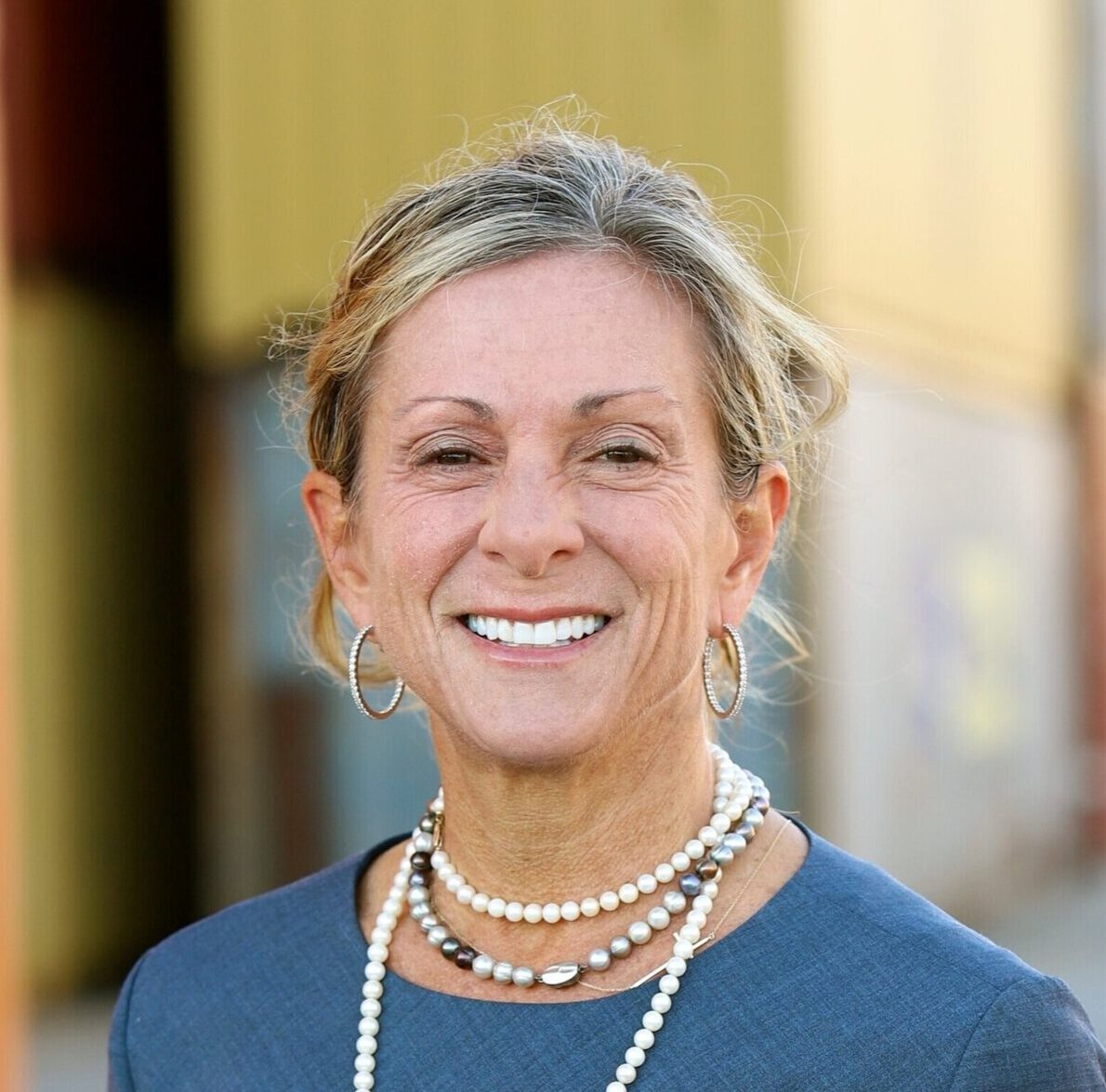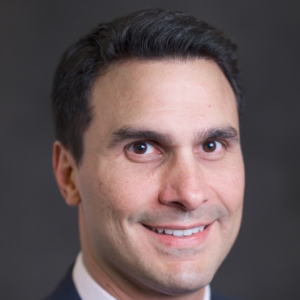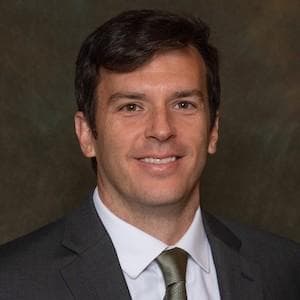Executive MBA – Global Supply Chain
Become a more effective senior leader with an EMBA for Global Supply Chain from an institution ranked No. 1 nationally for supply chain graduate programs.*
*Gartner, 2022.
EMBA for Global Supply Chain Highlights
Nurturing Global Supply Chain Leaders
An EMBA in 1 Year
Flexibility for Global Supply Chain Leaders
Complete the University of Tennessee Executive MBA with fewer than 30 days out of the office. Two residence periods occur at the University of Tennessee, Knoxville, and two at international supply chain hubs in Europe and Asia.
Industry Connections
A Global Network of Supply Chain Experts
Become immersed in an international network of supply chain executives—Haslam College of Business graduates and leading faculty and scholars—representing over 70 top supply chain companies.
Ranked Among the Best Supply Chain MBA Programs
Relevant and Applied Supply Chain Curriculum
Develop the vision, communication, and leadership skills to succeed in a global, multicultural environment through an unmatched end-to-end supply chain-focused MBA curriculum, ranked the No. 1 most relevant EMBA worldwide by The Economist.
Unmatched Value
Immediate ROI
Applied learning provides immediate ROI. Design a custom Organizational Action Project in counsel with one of our prominent faculty advisors and deliver key components to company leadership throughout the year.
EMBA for Global Supply Chain Program Structure
Executive MBA Overview
Participants complete the EMBA for Global Supply Chain in a single calendar year, spending fewer than 30 days out of the office. The average time commitment is about 15 hours per week for readings and assignments. Assignments relate directly to the work participants perform on the job, helping students retain and immediately apply new concepts.
The bulk of the learning takes place during four residence periods (RPs) of 9 days each, not including travel. Two RPs take place at the University of Tennessee, Knoxville, and two occur in international supply chain hubs in Europe and Asia.
In the case of governmental travel warnings or restrictions, we may utilize an online modality for some aspects of the program; however, we will diligently pursue on-ground learning experiences where possible. For questions and the most up-to-date information, please contact us at gscemba@utk.edu or +1 (865) 978-6486.
Asynchronous Distance Learning
Between each RP, you will participate in Asynchronous Distance Learning (DL) sessions, complete relevant and applied assignments, and work on your Organizational Action Project (OAP). The EMBA for Global Supply Chain program breaks from the traditional academic format of 3-hour course credits, integrating business topics in the classroom to replicate how they function in the real world. This format, along with a lockstep progression and the expectation that candidates’ work experience replicates fundamental courses, allows for the program’s compressed duration.
University of Tennessee Executive MBA Curriculum
The Executive MBA for Global Supply Chain is primarily a Master of Business Administration degree. The program uses applied learning strategies to help supply chain professionals develop critical skills including accounting, finance, logistics management, and marketing. Business leaders learn to leverage these core competencies in supply chain scenarios while adapting to the needs of a dynamic market.
To ensure our program cultivates agile leaders, Haslam’s supply chain faculty meet with the advisory board of UT’s Global Supply Chain Institute twice a year to review and amend the curriculum. More than 40 corporations comprise this advisory board, among them Amazon, Dell, FedEx, Johnson & Johnson, Procter & Gamble, and Pfizer. As the curriculum evolves to match real-time industry trends, individual courses may not be published until the start of each semester.
Industry-Driven Core Competencies
- Global business acumen
- Transformational capabilities
- Integrated business planning
- Integrated value chain
- Supply chain’s role in business performance
- Cutting-edge supply chain innovation
Applied Learning and Leadership Development
Through both individual and team assignments, we emphasize applying core competencies to address real-world problems from multiple perspectives. In place of a standard course list, students focus on common challenges that today’s executives face across all industries and countries.
Our residency periods provide ample opportunities for both the applied learning and leadership development components of the Executive MBA curriculum. During each period, participants:
- Learn how to evaluate company finances at practice within their industry
- Directly engage with corporations and government agencies through field visits
- Visit operating facilities to study supply chain issues
- Explore the cultural nuances and social, political, and business realities of key world regions
- Gain experience in conducting business overseas from international experts
- Take courses specifically geared toward global leadership, including coursework focused on ethical leadership and responsible business, negotiation, and strategy in both developed and developing markets
Throughout the program, students work with a faculty mentor to create a personalized leadership development program targeting their individual strengths and weaknesses, identified through a series of 360-degree assessments. These insights provide students with actionable takeaways that they can apply in their current roles and beyond.
Peer-to-peer relationships contribute significantly to leadership development throughout the program. Students spend a year in regular communication and collaboration with other senior supply chain leaders, exchanging ideas and best practices. Alumni often cite these relationships with their classmates among the most pivotal aspects of the program and one that endures long after graduation.
Organizational Action Project (OAP)
During the program, EMBA-GSC candidates participate in an Organizational Action Project (OAP) around issues of major importance to their organization. Each student designs their own project and works in concert with the company’s leadership team. They also work with a faculty advisor who provides mentorship and assesses deliverables throughout the program year.
Similar to a thesis, the project is graded independently of all other assignments, and our students’ average $6.5 million in return to their companies through OAPs.
Connecting Supply Chain to Other Functional Areas
Through completing a Haslam Organizational Action Project, the senior director of integrated supply chain for an international food manufacturer was able to widen his business perspective and be able to speak to people throughout his organization about how supply chain affects them. He benefited from taking an in-depth look at financials as well, and ultimately returned value, better connecting supply chain operations to other functional areas within the company.
Designing a $20 Million Facility
The CEO & President of a logistics service has consistently sent employees to Haslam for the Executive MBA for Global Supply Chain. During the Organizational Action Project, one of his employees designed a $20 million facility that is currently operational. Another developed a manager’s success profile that is being used to recruit and screen candidates as the company selects general managers.
The employees have shown a great deal of appreciation for the program’s flexibility and the OAP’s integration into existing company structures, according to the CEO & President. He added the Executive MBA for Global Supply Chain has provided unique opportunities for directors to not only learn theoretical knowledge, but also to secure company-specific training and secure promotions.
Sharpening the Decision-Making Process
The vice president of supply chain planning and logistics for a company producing chocolates knew she wanted to attend the Haslam Executive MBA for Global Supply Chain when she read marketing materials with information about the program’s Organizational Action Project.
During the eleven-month program and her OAP, the vice president improved her finance and accounting skills. This talent development sharpened her decision-making process, she said. Her growth allowed her to occupy a more central strategic role, and her sponsoring company saw ROI in that it filled out its leadership ranks.
Admissions
How to Apply
Interested candidates are encouraged to contact our program manager to discuss the program and whether it is a good fit prior to applying.
Complete your Application at https://apply.haslam.utk.edu/apply/.
- On the Program Selection page within your online application, please choose Business Administration under College.
- Scroll down to choose Executive MBA – Global Supply Chain under Program.
- Choose the next spring semester under Select Term.
- Click on Save Your Selection.
Review and Complete the Following Application Components:
- A resume
- References
- Transcripts
- $60 non-refundable application fee
- Personal Statement After you submit the application, please provide a concise personal statement that includes perspective on the items below:
- A brief description of your organization and a longer description of your role, including responsibilities, reporting relationships, and budgetary scope
- Critical challenges facing your organization and how these challenges impact your role
- Describe your motivation for pursuing an MBA
- Describe your plan for balancing your various commitments (work, school, family, etc.) while earning your MBA
Submitted Application (includes Application Fee)
A $60 non-refundable application fee is required to apply for the program.
Your Statement of Purpose is a very important part of your application. It helps us get to know you as a person, and can help differentiate you as a candidate by clearly outlining how you see the program connecting your past experiences with your future goals. After you submit the application, please provide a concise personal statement that includes perspective on the items below:
- A brief description of your organization and a longer description of your role, including responsibilities, reporting relationships, and budgetary scope
- Critical challenges facing your organization and how these challenges impact your role
- Describe your motivation for pursuing an MBA
- Describe your plan for balancing your various commitments (work, school, family, etc.) while earning your MB
Haslam requires that you provide transcripts from the institution(s) where you earned your bachelor’s degree(s) and from all institutions where you have been enrolled or earned credit for graduate-level coursework, even if a degree was not earned. You may upload copies of official transcripts for application review, but official transcripts are required to enroll. Refer to our transcript guidelines for more information.
The resume should list a candidate’s relevant work experience, internships, research, awards, and/or publications, as well as educational history. A curriculum vitae (CV) is also accepted.
GMAT or GRE scores are optional for this program. All scores, if available, must be sent directly to University of Tennessee, Knoxville by the testing agency. Scores more than five years old do not meet University of Tennessee, Knoxville application requirements. The University’s institutional code for the GRE is 1843.
If the applicant has an area of concern or would like to give more information to the faculty on a unique situation, i.e., poor grades, then an optional statement can be submitted.
We are accepting international applicants for the program. In addition to the above components, applicants with international (non-US) transcripts will need to have their transcripts evaluated by a NACES accredited evaluation institution (for example WES). A full list of evaluation institutions can be found here: http://www.naces.org/members.html.
International applicants might also be required to submit results of the TOEFL (Test of English as a Foreign Language) or the International English Language Testing System (IELTS). Minimum score requirements for admission to program are a total score of 100 on the internet-based TOEFL (iBT), or a 6.5 overall band score on the IELTS.
Only test scores within the last two years will be valid for consideration. Applicants may be exempted from the English Certification requirement if English is an official language in the applicant’s country of citizenship, according to standards published by the Graduate School, or if English is the primary language of instruction at the institution in which the applicant received an undergraduate, graduate, or professional degree, or on a case-by-case basis as determined by the Admissions Committee.
COVID-19 Response
The University of Tennessee, Knoxville, is committed to both the health and well-being of faculty, staff and students. We continue to accept applications to the EMBA for Global Supply Chain program, which begins in January 2021 and continue to render admission decisions.
Even while working remotely for the time being due to COVID-19, you can continue to rely on the admissions team at the Haslam College of Business and the University of Tennessee Graduate School for appropriate guidance and resources. Please contact us with any questions you might have:
Izabela M. VanDeest, Recruitment:
vandeest@utk.edu: 865-974-1612
Jon Holztrager, Program Director:
jholztra@utk.edu
The University of Tennessee Graduate School:
gradschool@utk.edu 865-974-2475
Events and Campus Visits
Live events: All on-campus events and classes have been moved online until further notice. However, there is the opportunity to attend a virtual class visit, engage in live discussions with the director, recruiter and faculty, and speak to a student reference. Please contact Izabela VanDeest at 865-974-1612 or vandeest@utk.edu for more information.
The COVID-19 Information & Support web page provides university-level updates on responses to the coronavirus. We will provide updates to prospective applicants and students as our office receives them.
Frequently Asked Questions
Recognizing that supply chains worldwide are under stress, we are making changes to streamline and simplify admissions processes. We encourage you to submit an application to the EMBA for Global Supply Chain program on the Executive MBA for Global Supply Chain application page.
Often, prospective students applying to the EMBA for Global Supply Chain program qualify for a GMAT/GRE testing waiver, depending on their professional work experience. To see if you qualify for a waiver, please contact Izabela VanDeest at 865-974-1612 or vandeest@utk.edu.
Prospective students are not required to travel for an in-person admission interview. However, we highly encourage campus visits or virtual visits. To schedule a visit, please contact Izabela VanDeest at 865-974-1612 or vandeest@utk.edu.
Important Deadline(s)
We encourage you to continue practicing social distancing and avoiding large gatherings to stop the spread of the coronavirus. Our team is dedicated to ensuring all virtual alternatives presented are informative and interactive. Our goal continues to be connecting you with members of the The University of Tennessee, Knoxville’s Haslam College of Business community as well as providing you with the opportunities to engage and get excited about joining the EMBA for Global Supply Chain program in January 2021. As we receive updates, we will share those with you. Be safe, and we look forward to communicating with you soon.
Go Vols!
Admission Criteria
All applicants to the Executive MBA – Global Supply Chain must first meet The University of Tennessee, Knoxville’s Haslam College of Business admissions requirements.
Requirements
- Minimum grade-point average of 2.7 or 3.0 during the senior year of undergraduate study. Previous graduate work (including foreign degrees) must have a grade-point average of 3.0 on a 4-point scale or equivalent. A strong record of professional or educational accomplishment may be considered an acceptable substitute if your GPA does not meet the minimum requirements.
- GMAT scores are waived for candidates with 5 years of managerial experience and an undergraduate grade point average of 3.0 or higher. GMAT scores are not required if you already have a graduate degree.
- Proficiency in spoken and written English. International applicants whose native language is not English must have taken the TOEFL within the last two years, experienced candidates may qualify for a TOEFL waiver.
Contact us to discuss if you qualify for any of these waivers.
Executive MBA for Global Supply Chain Criteria
- Significant professional achievement with increasing scope of responsibilities
- 5 years of professional work experience or more, 15-20 years average
- An academic record (combined with standardized test scores when required) that demonstrates the aptitude and commitment to complete an MBA while working
- Business acumen to contribute actively to the learning process
- Role at an organization where supply chain and business focused curriculum can be applied throughout the program
- Recommendations are optional, but highly encouraged by non-sponsored candidates. Candidates that are financially sponsored by their organization do not need written recommendations
MBA Veterans Services
In keeping with our full-service model for working professionals pursuing their education at the Haslam College of Business, we offer a full range of support that provides veterans with a direct path toward applying their benefits.
Our program coordinators and the university’s Veterans Resource Center are here to help you access the benefits you’ve earned serving our country.
What is the first step?
To apply for education benefits through the department of US Veterans Affairs please visit their website at www.benefits.va.gov/gibill/ or call 1-888-GIBILL-1 (1-888-442-4551). Once you have applied for benefits, the VA will review your application and you will receive your letter listing your eligibility.
What fees does the Post-9/11 GI Bill typically cover?
- In-state maintenance tuition and facilities fee
- Professional programs & services
- Library
- Technology, transportation and graduation fee
This is based on your percentage of entitlement. Contact Veterans Services to verify your benefits and receive further information.
What is typically not covered?
- Meals, parking, books, lodging, airfare and out-of-state tuition (usually equates to ~ 3% of tuition)
Yellow Ribbon Program
If you live outside of Tennessee, the Yellow Ribbon program may be an option to cover a portion of your costs. Under this scenario, the VA would pay half of your out-of-state tuition charges and the MBA program would match the other half.
You can qualify for the Yellow Ribbon program if you are enrolled in a graduate-level MBA program. You must have 100% entitlement with the Post-9/11 GI Bill and not be on active duty. Active-duty service members cannot qualify for the Yellow Ribbon program.
This program is allocated on a first-come-first-serve basis. The MBA program allows for 10 recipients each academic year. It can be used for all three semesters with a maximum $15,000 each academic year.
Academic Common Market
If you don’t qualify for the Yellow Ribbon program, another option may be the Academic Common Market. This is a tuition-savings program for college students in 15 states of the Southern Regional Education Board who want to pursue degrees that are not offered by their in-state institutions.
University of Tennessee EMBA Testimonials
“I’ve immediately seen results in three key areas: the academic foundation that the program is providing relevant to supply chain, the relationships that I’ve gained in the networking environment with my cohorts, and the evidence of cost savings and improving our overall supply chain organization based on the learnings of the program.”
“If you’re looking to jump-start your career, this is a great program. It pushes you to think differently about how you approach problems and leadership. And it’s a great opportunity to really push to the next level of your career.”
“In the first five months, my OAP provided almost a $15 million return to my organization. So, it has been extremely valuable. Having the resources from the university as well as the practitioners in the cohort to bounce ideas off of and really polish what you want to achieve with the OAP has provided dividends for my company.”
“I have already started to see a return on my investment from this program. One of the projects that I led as part of my OAP is going to deliver several million dollars of cost savings to my company at a time of inflation when margins really need to be boosted.”

“This MBA really teaches you to think not as an individual, but as a teammate.”

“This is a great way to get a quality education, learn from industry leaders academically, and also from a peer group that is outstanding.”

“I have learned how to speak the language of my CFO and the language of business and be able to connect that language to actions I’m taking in the supply chain.”

“I now have friends all over the world I can contact to understand what’s going on inside their organization, both as a whole and in specific areas. We have the confidence and the trust to ask.”
The Learning Experience
Support for Students
The Haslam Executive MBA for Global Supply Chain staff takes care of the details during residency periods so participants can focus on their work and studies.
Our staff attempts to anticipate students’ needs and are part of an intimate group when classes are in session. Staff services include:
- A one-stop source for personalized support throughout the program
- Step-by-step assistance with the admissions process
- Books and program material delivery to your home
- Arranging most meals and reserved blocks of lodging during residency periods
- Class registration and clear instructions regarding all paperwork
- Assistance for all graduation activities from fittings for cap and gown to welcoming family members
The Executive MBA for Global Supply Chain’s faculty members get to know each student on a first-name basis and often become lifelong connections which endure long past graduation. Faculty members provide their mobile and e-mail contacts, striving to respond to any question within 24 hours.
Accommodations
Most students stay at the Hilton Downtown while in residence at UT. Hilton Downtown is a 15-minute walk through campus to the Haslam Business Building, although the program provides shuttles for door-to-door service.
Other Accommodations:
EMBA for Global Supply Chain Tuition and Financial Aid
This page covers the expected tuition for your program, the ways you might pay for it, and outcomes.
$106,000
is the total cost of attendance
$90,000
in tuition and program fees
~$16,000
in travel (airfare and lodging) expenses while attending the four residency periods
The program fee includes:
- All university tuition and fees
- Case studies, periodicals for required reading
- Technical support for all software
The program fee does not include:
- Books, professional subscriptions, and supplies
- Laptop computer (if needed, you can purchase a laptop at a discount through the UT Computer Store)
- Lodging and travel for the residency periods
*UT reserves the right to adjust tuition and fees when deemed necessary. These are set by the UT Board of Trustees in June/July of each year.
Please see the FAQ section to review the tuition payment schedule.
Is an EMBA for Global Supply Chain a Good Investment
Current students and graduates of Haslam’s EMBA for Global Supply Chain bring exceptional value to their organization by contributing at the highest level while earning their degrees. The program curriculum includes a number of major assignments and a thesis-like company project, both of which are structured to immediately provide value to your professional growth and your organization.
As a result, students have much more than a degree to add to their resume upon completion of the EMBA for Global Supply Chain. The program forces students to improve processes, achieve higher goals, and conduct a transformative project, which results in 70 percent of students receiving promotions within two years of graduation.
With the Organizational Action Project providing immediate ROI to each student’s organization, companies return each year, giving their leaders the tools to create a sustained competitive advantage for their business.
Financial Assistance Options
Students have a variety of options to fund their tuition. Some of the most frequently used funding options are included below, but we encourage you to consult with the Financial Aid Office and/or a financial advisor when determining the best options available.
Scholarships
Most EMBA-GSC students earn partial scholarships from the department at the discretion of program leadership.
In addition, we recommend the FastWeb scholarship search site for external scholarship opportunities.
Employer Sponsorship
Many applicants’ employers provide full or partial financial assistance, as the EMBA for Global Supply Chain assignments relate directly to work and improve employee performance and retention.
Military Service Programs
Details and eligibility guidelines for the Post-9/11 benefits, including the Yellow Ribbon Program, can be found through the Department of Veterans Affairs. Applicants can also contact The University of Tennessee Office of Veterans Affairs: utkva@utk.edu or 865-974-1500.
Loans
Fellowships/assistantships are not available for this program, but you may qualify for federal financial aid. Learn about federal student loans here One Stop Express Student Services.
The Federal government provides loan options for graduate students, even if they do not qualify for need-based financial aid. The UT Financial Aid Office works with two types of U.S. federal government loans:
- Federal Direct Loans: This is generally the lowest-cost loan available, for up to $20,500 every academic year. You must be a U.S. citizen or permanent resident, take at least six credits per semester, and submit the FAFSA (Free Application for Federal Student Aid) to qualify.
- Federal Graduate PLUS Loans: If you need to borrow more, then a Graduate PLUS loan can generally cover the remainder. You will need to submit the application for the Federal Direct loan prior to applying for the PLUS.
If federal loans are unavailable or insufficient, we can help you explore private or alternative education loans. Unlike federal loans, private loans do not require a FAFSA to apply. Private loans are not based on need, and approval is generally based on creditworthiness and ability to repay. Some students may need to apply with a credit-worthy co-signer. Interest rates, grace periods, repayment options, and fees are determined by the lender and can vary considerably from lender to lender; generally, they charge higher rates than Federal loans. For more information on private loans, please visit our private lender list.
Contact
If you have any questions, please email us at gscemba@utk.edu or call us at 865-381-2017.
Career Impact of an EMBA for Global Supply Chain
Setting the Standard for Supply Chain MBA Programs
Haslam’s EMBA for Global Supply Chain students bring exceptional value to their organization by contributing at the highest level while earning their degree. The program curriculum includes a number of major assignments and a thesis-like company project, both of which are structured to immediately provide value to your organization.
As a result, students have much more than a degree to add to their resume upon completion of the EMBA for Global Supply Chain. The program forces students to improve processes, achieve higher goals, and conduct a transformative project, resulting in 70 percent of students receiving promotions within two years of graduation. Many of our students come from companies with a formalized process to send key talent to the EMBA global supply chain program because of the results previous graduates delivered. These companies return each year, giving us the privilege of helping their leaders create a sustained competitive advantage for their businesses.
Alumni Network
The Haslam College of Business has more than 70 formal partnerships with leading companies in supply chain management, including approximately half of the organizations listed in Gartner’s list of Top 25 Supply Chains. We serve as a hub of knowledge, facilitating relationships for professionals improving supply chain management practice. Our graduates drive this interchange and all benefit from this tremendous network. We help keep all EMBA program graduates connected, so alumni can continue to rely on classmates as a resource, obtain new perspectives that cross industries and broaden their professional networks. Our staff sends regular updates on the program and fellow alumni. We also host a number of special events and provide information on how graduates can keep their education current.
Announcements on alumni promotions and job changes, thought leadership from Haslam faculty and feature articles on the program. For more information or to update your information please contact: gscemba@utk.edu.
The EMBA program hosts events in different cities across the United States and a yearly EMBA alumni reunion weekend organized around a UT home football game.
The EMBA class of 2001 started a generous endowment for the program, and more than 90 percent of that class year contributed. The tradition has continued with each graduating class, and funds to help improve the program for future classes. To donate, visit the University of Tennessee online giving site or contact the Haslam College of Business Office of Development & Alumni Affairs.
EMBA graduates are part of the greater VolNation and have access to an even broader network of UT alumni. Register at VolsConnect to take part in the University of Tennessee’s exclusive online community for alumni.
The Haslam College of Business offers a full range of learning opportunities in a host of areas critical to continued development. We also offer customized, on-site executive education for almost all of our courses.
Employer Sponsorship
Most Executive MBA for Global Supply Chain students are fully or partially funded by their employers. While this is not always the case, we recommend that candidates start the conversation with their employers highlighting a few key points.
Disclaimer: This letter is meant to be a starting point for candidates pursuing employer sponsorship. It is not applicable or ideal for all situations. Candidates should know the unique context of their company and disposition of their manager and edit the letter accordingly or even pursue a different approach to negotiations.
Our EMBA graduates report an average of $6.5 million in return to their organizations through the course of the program. The majority of this comes from the thesis-like Organizational Action Project, in which students examine a key area in need of change at their company and build a plan to improve it. Haslam’s EMBA centers around direct application in the workplace and the formality of a degree program forces employees to take the time to execute major projects. Sending top talent to Haslam’s EMBA often costs less than professional consultation fees that companies pay to fix such issues, and the projects are approached with greater insight and long-term vision.
Sponsoring students in the Executive MBA for Global Supply Chain program is a leadership development and talent retention tool for employers. Throughout the program’s duration, less than 3 percent of our alumni have left their organizations. The program’s design creates a strong bond between company and employee, unlocking the employee’s potential to deliver substantial value.
Pursuing an EMBA ensures participants engage with peers at the same stage of their career during the program. Haslam’s industry-specific Executive MBA for Global Supply Chain ensures that graduates build a network of 20-30 colleagues who face the same challenges of managing a worldwide supply chain network. Haslam’s graduate supply chain programs have been ranked in the top three globally by Gartner for several years, and its faculty are regularly recognized for their empirical research. They connect students with their global network through speakers and site visits. Our network of more than 60 companies also gives us a strong understanding of current industry trends and challenges.
Haslam’s Executive MBA for Global Supply Chain takes employees out of the office for fewer than 30 days. Participants earn their degree in a single year. We accomplish this by assigning homework on the job. Students do not follow the traditional approach of learning in a classroom then practicing on paper at home then finding ways to apply their learning after graduation. Our students discuss best practices and strategies in the context of their organization and analyze their own business as part of their assignments.
Key Dates
Online Events
Program Profile
32%
Female
32%
International
100%
Employed Full-time
20-25
Students per year
42
Average Age
17+
17+ years average managerial experience
Countries Represented
USA
China,
Austria
Egypt
Saudi Arabia
Russia
India
Ukraine
Brazil
Canada
Japan
Thailand
Singapore
UAE
Spain
Switzerland
Argentina
Mexico
Companies Represented
Mondelez International
Dell
Cummins
Caterpillar
Kenco
Pilot Flying J
SC Johnson
Martin Brower
Eastman Chemical
Johnson & Johnson
McCormick
Linfox
IBM
Boeing
Fairfield Nodal
Selected Job Titles
Senior manager
Director
VP
General Manager, Contract Warehousing
Global Demand Manager
Linehaul Supervisor
Logistics Analyst
Operations Group Leader
Operations Supervisor
Production Planner
Project Manager
Senior Buyer
Senior Manager, Trade and Customs
Sourcing Manager
Sourcing Team Leader
Supply Chain Product Manager
TMS Analyst
Vice President, Distribution
EMBA for Global Supply Chain FAQs
Program Details
The EMBA-GSC is an 11-month supply chain-focused Master of Business Administration degree that contextualizes business topics around supply chain. The MS SCM Online is an 18-24 month specialized supply chain Master of Science degree that primarily covers technical supply chain topics.
The EMBA-GSC teaches candidates to lead an organization through a supply chain lens. Candidates typically hold distinct leadership roles with 7-20+ years of experience and desire to have more impact on their entire organization, not just the supply chain arm. Approximately 15 percent of the curricular content is supply chain-focused—the other 85 percent is leadership-based.
The MS SCM Online students learn the theory and strategy around supply chain concepts, functions, and enablers in order to create value for their organizations. Candidates range in their experience levels but have a minimum of 3-7+ years of supply chain expertise. Meet some of our MS SCM Online students.
See what makes each program different, and find the one that fits your career goals.
The EMBA-GSC has one start date a year, at the end of January.
The program fee is $90,000. In addition to the program, candidates should expect about $16,000 in out-of-pocket expenses for the four residency periods.
Yes. Tuition payments are made in three, fairly equal installments prior to the start of each semester. Contact your enrollment advisor if you have questions about financial aid, lump sum payments, company billing requirements, or yearly educational tuition reimbursement caps.
Admissions
To complete your application at https://apply.gradschool.utk.edu/apply, you will need:
- A resume
- References
- Transcripts
- $60 non-refundable application fee
EMBA-GSC applicants should have the following:
- 5+ years of professional work experience; 15-20 years desired
- Bachelor degree from an accredited institution; 2.7 min GPA (exceptions may be available for minimum GPA)
- Business acumen to contribute actively to the learning process
- A professional role that enables the day-to-day application of EMBA-GSC curriculum
- Strong recommendations and robust employer support
GMAT scores are waived for candidates with 5 years of managerial experience and an undergraduate grade point average of 3.0 or higher. GMAT scores are not required if you already have a graduate degree.
Want to learn more? Email us at gscemba@utk.edu or give us a call at +1 (865) 978-6486.
Faculty

John Bell
Daniel & Karen Myers Faculty Scholar; Nancy & David McKinney Faculty Research Fellow; John “Red” Dove Professor of Supply Chain Management



Russell Crook
First Horizon Professor, Department of Management & Entrepreneurship; Cheryl Massingale Faculty Research Fellow

Stephanie Eckerd
Associate Professor; FedEx Corporation Professor of Supply Chain Management; Director of Supply Chain Management Ph.D. Program


Larry Fauver
James F. Smith, Jr. Professor in Financial Institutions, Haslam Family Faculty Research Fellow, and Professor

Mike Grojean
Fellow, Global Supply Chain Institute; Lecturer; Director, Executive MBA for Strategic Leadership

Kelly Hewett
Associate Professor, Reagan Professor of Business, and Haslam Family Faculty Research Fellow





Lance Saunders
Associate Professor; Jerry & Suzanne Ratledge Professor of Supply Chain Management

Georg Schaur
Professor; George A. Spiva Scholar; R. Stanley Bowden II Faculty Research Fellow, Department of Economics


Alex Scott
Associate Professor; Gerald T. Niedert Professor in Supply Chain Management


Ted Stank
Co-Executive Director, Global Supply Chain Institute; Harry J & Vivienne R. Bruce Chair of Excellence in Business; Haslam Family Faculty Research Fellow

Wendy Tate
McCormick Endowed Professorship; William J. Taylor Professor; Haslam Family Faculty Research Fellow

